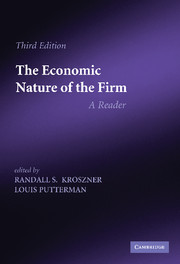Book contents
- Frontmatter
- Contents
- Editors' preface
- Reintroducing The Economic Nature of the Firm
- Part I Within and among firms: the division of labor
- Part II The scope of the firm
- Part III The employment relation, the human factor, and internal organization
- Part IV Finance and the control of the firm
- 19 Mergers and the market for corporate control
- 20 Agency problems and the theory of the firm
- 21 Theory of the firm: managerial behavior, agency costs, and ownership structure
- 22 Organizational forms and investment decisions
- 23 The rise in managerial stock ownership
- 24 Executive compensation as an agency problem
- 25 An economist's perspective on the theory of the firm
- 26 Ownership and the nature of the firm
- References
- References
25 - An economist's perspective on the theory of the firm
Published online by Cambridge University Press: 05 June 2014
- Frontmatter
- Contents
- Editors' preface
- Reintroducing The Economic Nature of the Firm
- Part I Within and among firms: the division of labor
- Part II The scope of the firm
- Part III The employment relation, the human factor, and internal organization
- Part IV Finance and the control of the firm
- 19 Mergers and the market for corporate control
- 20 Agency problems and the theory of the firm
- 21 Theory of the firm: managerial behavior, agency costs, and ownership structure
- 22 Organizational forms and investment decisions
- 23 The rise in managerial stock ownership
- 24 Executive compensation as an agency problem
- 25 An economist's perspective on the theory of the firm
- 26 Ownership and the nature of the firm
- References
- References
Summary
An outsider to the field of economics would probably take it for granted that economists have a highly developed theory of the firm. After all, firms are the engines of growth of modern capitalistic economies, and so economists must surely have fairly sophisticated views of how they behave. In fact, little could be further from the truth. Most formal models of the firm are extremely rudimentary, capable only of portraying hypothetical firms that bear little relation to the complex organizations we see in the world. Furthermore, theories that attempt to incorporate real-world features of corporations, partnerships, and the like often lack precision and rigor and have therefore failed, by and large, to be accepted by the theoretical mainstream.
This article attempts to give lawyers a sense of how economists think about firms. It does not pretend to offer a systematic survey of the area; rather, it highlights several ideas of particular importance, and then explores an alternative theoretical perspective from which to view the firm. Part I introduces various established economic theories of the firm. Part II turns to a newer theory of the firm, based not upon human capital structures, but rather upon property rights. Part III synthesizes this property rights-based theory of the firm with more established theories.
Established theories
Transaction cost economics
While the neoclassical paradigm, modified by principal–agent theory, progressed along the above lines, a very different approach to the theory of the firm developed under the heading of transaction cost economics.
- Type
- Chapter
- Information
- The Economic Nature of the FirmA Reader, pp. 346 - 352Publisher: Cambridge University PressPrint publication year: 2009



